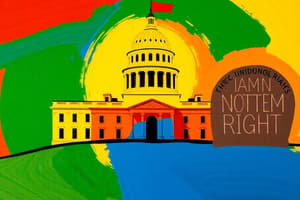Podcast
Questions and Answers
What are the 6 Principles of the Constitution?
What are the 6 Principles of the Constitution?
What does popular sovereignty mean?
What does popular sovereignty mean?
The idea that government is created by and subject to the will of the people by the 'consent of the governed'.
What is limited government?
What is limited government?
The principle that the powers and functions of government are restricted by the US Constitution and other laws.
Define separation of powers.
Define separation of powers.
Signup and view all the answers
What are checks and balances?
What are checks and balances?
Signup and view all the answers
What is judicial review?
What is judicial review?
Signup and view all the answers
Explain federalism.
Explain federalism.
Signup and view all the answers
Study Notes
6 Principles of the Constitution
- Key principles include popular sovereignty, limited government, separation of powers, checks and balances, judicial review, and federalism.
Popular Sovereignty
- Government derives authority from the consent of the governed, emphasizing that the people's will is foundational.
- Governments exist to serve the interests and rights of the populace.
Limited Government
- Government powers are restricted by the Constitution and laws, ensuring that no entity is above the law.
- The First Amendment prohibits Congress from enacting laws that infringe on individual freedoms, illustrating limited power.
Separation of Powers
- Government functions are divided among three branches: executive, legislative, and judicial, each having distinct powers and responsibilities.
- The President enforces laws, while only Congress holds the power to declare war, preventing any one branch from monopolizing authority.
Checks and Balances
- Each branch of government has mechanisms to limit the powers of the others, promoting accountability and preventing abuses of power.
- The House of Representatives can impeach the President, but a two-thirds majority vote in Congress is required to overturn a presidential veto.
Judicial Review
- This principle allows the judicial branch to assess the constitutionality of legislative and executive actions.
- The Supreme Court has annulled over 900 state laws deemed unconstitutional, exemplifying the power of judicial review.
Federalism
- Power is divided between a central government and various territorial subdivisions, creating a layered system of governance.
- The United States operates under national, state, and local governments, with laws that can vary by jurisdiction, such as California's ban on texting while driving.
Studying That Suits You
Use AI to generate personalized quizzes and flashcards to suit your learning preferences.
Description
Explore the fundamental concepts that form the backbone of the U.S. Constitution through these flashcards. Understand key principles like popular sovereignty, limited government, and separation of powers. Perfect for students wanting to solidify their understanding of constitutional foundations.




